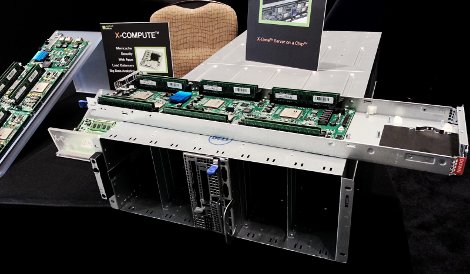Dell has made its first 64-bit ARM server available to developers to test and write software for. The proof-of-concept platform is available at the vendor's Solutions Center in Round Rock, Texas, and is in the process of being rolled out at its Singapore center.
The platform is running Fedora's Linux operating system and is based on the X-gene System-on-Chip (SoC) by AppliedMicro Circuits Corp., one of the top contenders in the newly developing market for server processors based on designs by UK's ARM Holdings.
Dell's decision to use X-gene in its first 64-bit ARM platform boosts AppliedMicro's position in the market where it competes with companies such as AMD, Cavium and Texas Instruments. It has been racing with AMD and the now-defunct chip maker Calxeda to bring 64-bit ARM chips to market, and 2014 is widely expected to be a coming-out year for ARM in the data center.
ARM has traditionally been licensing its processor designs to companies making chips for smart phones. Today, ARM chips dominate the mobile market, but their low power requirements (as compared to x86 chips) and availability of the design for customization have made it attractive for data center applications.
Previously available 32-bit ARM SoCs failed to gain momentum in the server market, where most applications require the 64-bit capability of addressing memory.
After Calxeda, an Austin, Texas-based ARM processor startup shut its doors in December due to inability to raise enough funding to continue operations, AMD and AppliedMicro became the two contenders closest to bringing 64-bit ARM to market.
AMD said last week that it will start sampling its 64-bit ARM SoC, codenamed “Seattle,” by the end of the first calendar quarter.
“As the ARM server ecosystem is still developing, our focus has been on enabling developers and customers to create code and test performance with 64-bit ARM microservers in order to foster broad-based adoption,” Stephen Rousset, director of DCS Architecture at Dell, wrote in a blog post announcing the latest proof of concept.
Also last week, ARM released a standard specification for servers based on its 64-bit ARMv8 processor design. The spec's aim is to standardize aspects of server platforms important to software developers to accelerate creation of a software ecosystem for ARM servers.

